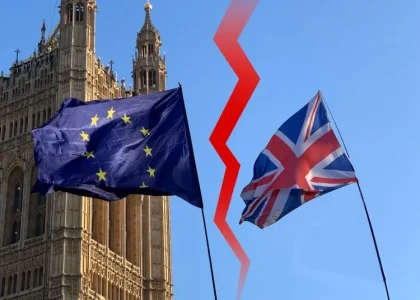Now that the campaigning has finished and reality has struck, it is time to assess the likelihood of post-Brexit trade deals. In the case of the US, the chances are not in our favour.
In the aftermath of Brexit, UK PM Boris Johnson released a statement hailing a promising future trade deal between the US and the UK. Mr Johnson mentioned how ‘this transatlantic trade deal will reflect the unique closeness of our two great nations’ and will truly benefit the British economy and people. The number of barriers that must be addressed mean that, however exciting this prospect may seem, a fully working trade deal between the US and the UK will not be achieved any time soon. And even if it does, the reality could be much less exciting than many believe.
The first barrier to a trade agreement is the dispute over what we could call ‘issue-specific’ concerns. These include the specific conditions that will determine the possibility of an agreement. To start with, there is the persisting question of the NHS. In 2019, Mr Trump explained how the NHS would be part of a ‘magnificent’ trade deal with the UK. The US seeks greater commercial access for their pharmaceutical companies, reinforcing competition over public tenders and promising more choice for UK consumers. However, according to YouGov, 54% of Britons are satisfied with their healthcare system. As for those who are dissatisfied, their concerns are about issues such as long waiting times, number of staff and low government funding. In fact, when asked in 2017 whether the NHS should be run by the public sector, 84% of respondents agreed, while only 10% believed it should be run by the private sector. People are happy with the NHS, and those who show dissatisfaction are also likely to oppose any interference from the US. This means that granting US companies greater access is an unpalatable proposition for the majority of the British public.
Another source of disagreement concerns food standards. According to food and trade policy expert Sue Davies, there is are major differences in food production systems in both countries, which could cause setbacks in the negotiations. One of these differences is the amount of chemicals used in US food production, such as hormones in the production of beef. These practices are currently banned under the UK law for health reasons, which may prove problematic for striking a deal. Mr Johnson has claimed that the ‘NHS is not on the table’ and that the UK will not prejudice ‘food hygiene’ in any way, which would clash with US priorities.
The second barrier relates to UK sovereignty. Polling data by YouGov shows how leave voters in the UK primarily see Brexit as an opportunity for the country to regain sovereignty, prioritising the UK’s independence in terms of economic policies and immigration controls. However, to achieve an agreement with the US, the country might have to trade some of this sovereignty away, as Mr Trump expects the UK to follow his country’s lead on certain issues. In February 2020, the UK government allowed the massive Chinese corporation Huawei continual access to UK markets. This was done despite disapproval and discouragement by top US officials, who view Huawei as a security and commercial risk. In reaction, US Vice President Mike Pence has hinted that this action by the UK might be a ‘deal-breaker’ for a future trade agreement. This type of behaviour exemplifies how the US will expect the UK to follow some of their laws and regulations and attempt to influence the decisions of the UK government in various fields. This puts the UK government in an awkward position, which may cause further setbacks in trade negotiations.
Finally, there are other trade agreements that are being negotiated in parallel. The UK is currently negotiating a comprehensive trade agreement with the EU, which is of great importance for both parties. At the same time, and despite the failure of the Trans-Atlantic and Investment Partnership (TTIP) in 2016, Donald Trump has also set his eye on Europe. It is undeniable that all of these negotiations are set to affect one another, which means that Washington is likely to wait and see the nature of the EU-UK trade deal before finalising any US-UK agreement. Despite British optimism, this is likely to cause even further delays in negotiations.
Even if, despite all these barriers, the US and the UK manage to reach an agreement, the reality risks not living up to the promises. The ‘deal’ could in fact represent a more political opportunity than an economic one. Both Mrs Johnson and Trump view it as a potential political victory. For Mr Johnson, a trade deal would demonstrate the ‘opportunities’ represented by Brexit and increase his popularity amongst the British public. For Mr Trump, a trade deal would reward Britain for abandoning the EU, thus undermining an institution he deeply distrusts. A trade agreement with the US would only boost the UK’s economy by 0.16% of GDP by the middle of the next decade, at most, according to the UK government. It also estimated that the UK economy would shrink up to 7.6% in 15 years’ time without a post-Brexit deal with the EU, and about 4.9% with a Canada-style deal. These estimates suggest that a deal with the US is not an appropriate replacement for the economic benefits of a close relationship with the EU.
Although a UK-US trade agreement would present some benefits for both countries, the reality is that there are very significant barriers to achieving one, which making it rather unlikely. Did Johnson and other leaders lie to the British people then? Are all these ‘great post-Brexit deals’ nothing more than a scam? That is up for the public to decide. However, here is a hint: a US-UK deal is unlikely to happen any time soon, and if it does, the reality will be much less exciting than the promises made.
Mateo Lazarus-Sanz is a UEA Politics and International Relations graduate, with an academic focus on EU Politics and Politics in the USA. This piece was written as part of the final year module ‘Britain and Europe’ run by Pierre Bocquillon.





